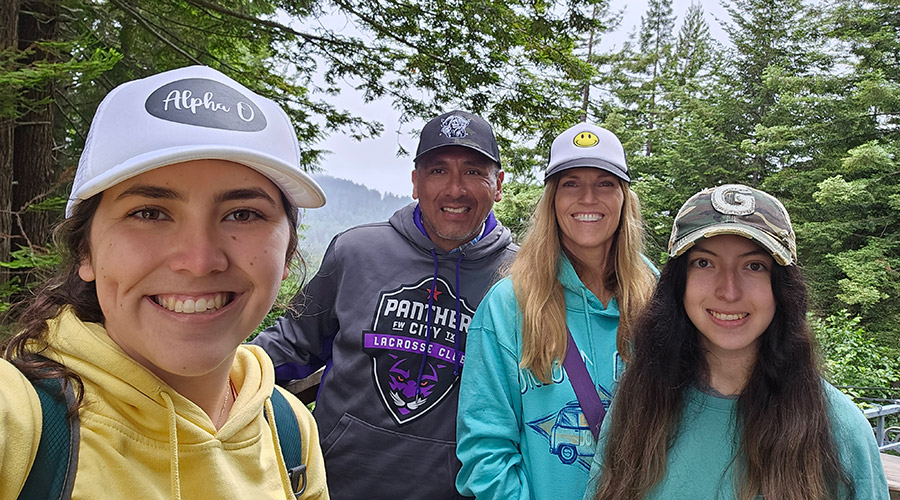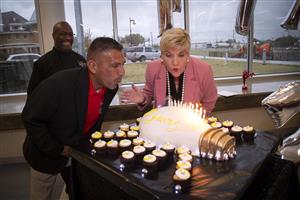
POWER 9® PEOPLE
An ongoing series about people improving their well-being
 Fort Worth is the largest certified Blue Zones Community® in the country. Each month we talk to a different member of our community and find out how they experience well-being. This month’s featured guest is Miguel Garcia, director of Fort Worth After School – the Fort Worth Independent School District’s nationally recognized afterschool enrichment program. Born and raised in West Fort Worth, Garcia left town to attend college but returned home to raise his family.
Fort Worth is the largest certified Blue Zones Community® in the country. Each month we talk to a different member of our community and find out how they experience well-being. This month’s featured guest is Miguel Garcia, director of Fort Worth After School – the Fort Worth Independent School District’s nationally recognized afterschool enrichment program. Born and raised in West Fort Worth, Garcia left town to attend college but returned home to raise his family.
Q: Many of us can relate to the relief that working parents feel at having a safe place for their kids to be between the end of the schoolday and the end of our workday. But the program serves another purpose as well.
A: National neighborhood associations and law enforcement agencies say juvenile crime peaks between about 3:30 and 6 p.m. Kids who are left to their own devices don’t always make the best choices. We try to make sure the kids have access to caring adults so that they’re offered better options.
 Q: All the data about brain and cognitive development show that the adolescent brain doesn’t fully develop until age 25.
Q: All the data about brain and cognitive development show that the adolescent brain doesn’t fully develop until age 25.
A: Right, and when you overlay trauma and poverty on the developing adolescent brain, it’s difficult. Fort Worth After School offers age-appropriate programming that challenges kids from elementary to high school to think critically and out of the box.
Q: Tell us about the scope of the program.
A: On a daily basis we have approximately 6,200 kids across 96 different sites participating in after-school enrichment and development programs.
Q: And Fort Worth After School aims to help kids build connections with fellow students?
A: Most of the programs are site-based programs, operated by school-day staff at the respective campuses. That means the staff and teachers know what’s going on in their students’ lives. We find the kids feel a higher level of connectedness to the school when they participate at a site-based Fort Worth After School campus.
Q: Let’s talk pickleball! Pickleball has become something of a national craze these days, and Fort Worth After School is using the popular sport to get kids moving.
A: We want to get kids out of seats and into some kind of activity and exercise, to be active and learn about healthy lifestyles. We have 14 schools participating in our new pickleball effort.
 Q: When you say pickleball, it conjures up an image of a couple of older people bouncing around a pickleball court. How are elementary schoolers enjoying the game?
Q: When you say pickleball, it conjures up an image of a couple of older people bouncing around a pickleball court. How are elementary schoolers enjoying the game?
A: The kids are having a blast. Texas Health has been super supportive through its well-being programs and has provided two courts for each school. Most are mobile courts in elementary schools, but Paschal High School has its own court. We’re hoping the high schoolers will serve as mentors to the younger students.
Q: Pickleball seems fairly easy to learn, and you don’t need a lot of gear.
A: The game involves minimal equipment. We have been able to supply all the necessary equipment. We try to minimize the stress put on parents about purchasing additional equipment.
Q: What’s the end-goal for these 14 schools? Is pickleball going to become competitive?
A: I’m glad you asked! We’ll culminate in March with a district-wide pickleball tournament at R.D. Evans Recreation Center. Students from Paschal will referee and support the event.
 Q: Fort Worth After School gets funding from a variety of sources, including the Fort Worth Crime Control Prevention District (CCPD) and the State of Texas.
Q: Fort Worth After School gets funding from a variety of sources, including the Fort Worth Crime Control Prevention District (CCPD) and the State of Texas.
A: The CCPD gives the district a percentage of the funds raised from the half-cent tax on items purchased in Fort Worth. One of the main goals is to reduce juvenile crime by providing enrichment programs across the city. After School also addresses chronic absenteeism and school performance. Additionally, the state provides funds through the 21st Century Program to five middle schools and five high schools for educational support like homework help and tutorials. Funding also helps us provide programs for exploration into college, career, and military readiness.
Q: Next year is a special anniversary for Fort Worth After School. How can people support your pickleball league or other programs?
A: Next year is our 25th year of programming. If you donate to United Community Centers, which oversees our funds, they’ll earmark it to us – and you’ll get the tax deduction.
Learn more about Fort Worth After School locations, free programs, and online homework assistance at https://www.fwisd.org/Page/29864
Learn more about well-being and the Power 9 at LiveLongFortWorth.com.
